Years ago, the thought of someone living in a van would instantly make people think of the infamous van down by the river SNL skit where falling on hard times was the only reason for living in a vehicle. Now, society has flipped this notion on its head and van life has become a cool new trend for people seeking adventure and freedom.
*This post may contain affiliate links, as a result, we may receive a small commission (at no extra cost to you) on any bookings/purchases you make through the links in this post. As an Amazon Associate, we earn from qualifying purchases. Read our full disclosure
With photos of dreamy vans and picture-perfect van life moments plastering Instagram feeds everywhere, the lifestyle is portrayed as a magical experience with seemingly no worries in sight. Is that what living in a van is really like?
After spending a few months on our own van life journey, we’ve come to realize that the truth lies somewhere in between. This lifestyle does deliver a fair few “pinch me” moments, but it also comes with a lot of hard work behind the scenes.
To share the truth about living in a van with you, we’ve put together this article answering your most frequently asked question: we dive deep into questions like “where we go to the bathroom” to “how we survive living with each other 24/7”.
Let’s put the insta-perfect photos aside and dive into the nitty-gritty of van life!
Traveling Soon? Here is a list of our favourite travel providers and accessories to help get you ready for your upcoming trip!
What is van life?
Beyond the basics of actually living inside of a vehicle, van life is a social movement that’s rooted in traveling, living with less, and connecting with nature. People all over the world are leaving their desk jobs and mortgages behind to live a life of nomadic adventure and minimalism.
For us, van dwelling is an extension of our traveling lifestyle that allows us to have our home with us while embarking on all kinds of new adventures. We’re not tied down to one location and we have the freedom and flexibility to roam at our own pace and on our own path.
Why do people choose to live in a van?
There are many reasons why people choose to live in a van and there’s no one reason that applies to everyone. For us, it’s all about the freedom to travel while being able to “stay home” at the same time. It’s the perfect balance during the pandemic since we’re able to spend time in nature and explore the country while still keeping ourselves distanced from others. It’s amazing having a cozy home to return to that’s only a few steps away from wherever we are.
In normal times, living out of a van means being able to travel to unique destinations in places that are off the beaten path in every corner of the world (that are road-accessible, of course!). The global van life community consists of people from all walks of life who collectively share some of the same values and hunger for new experiences.
Aside from travel, living in a converted van is also a way for some to own a home that’s completely their own and free from rent or mortgage payments. A van can be a mobile surf wagon, a climbing hub on wheels, or a portable mountain biking garage—whatever you like to do, your tiny home will be there waiting for you because your home is where you park it.
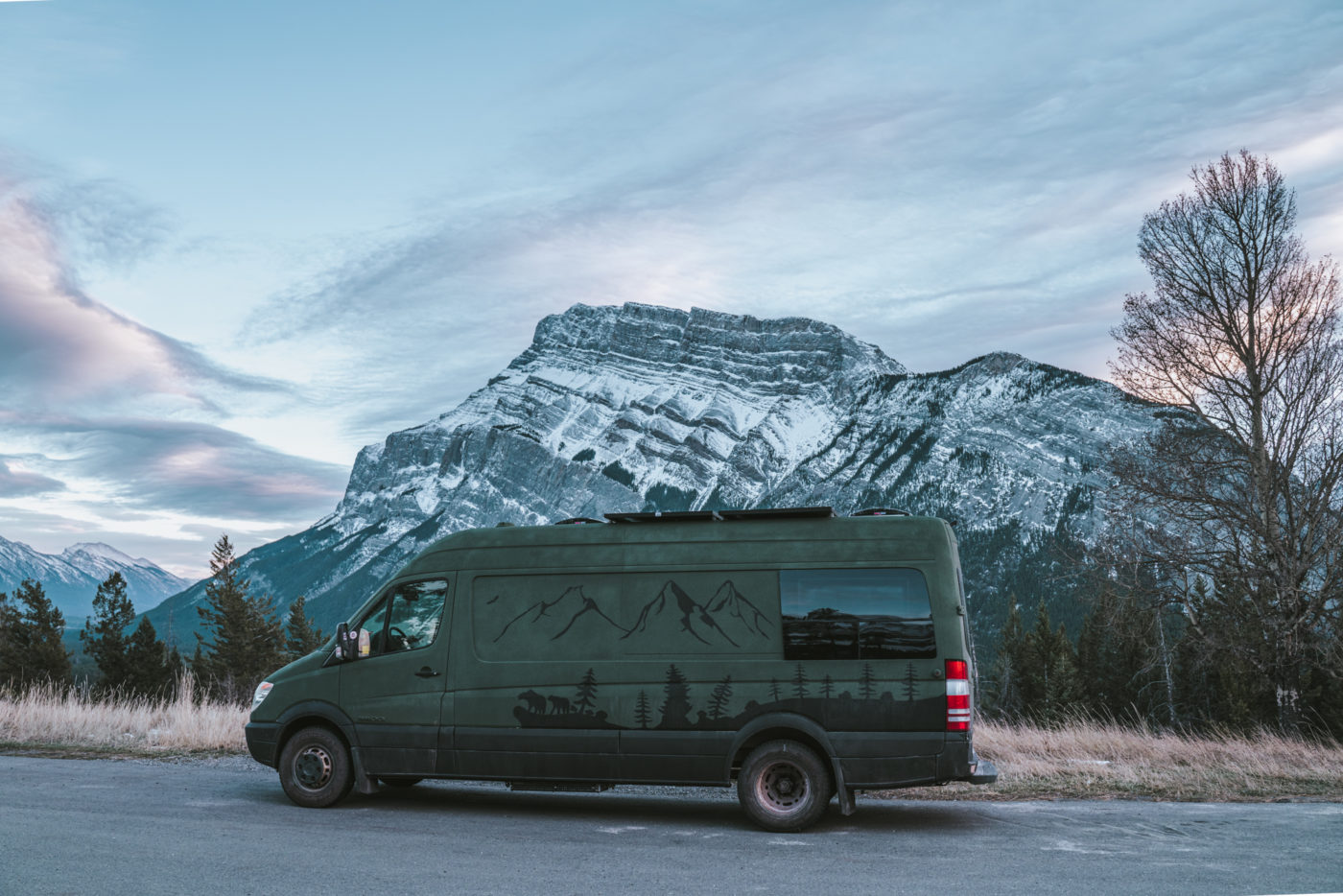
Where do you park overnight?
Finding places to park overnight can be stressful but is a big part of the adventure that is van life.
The easiest place to park up for the night are campgrounds and RV parks. These are plentiful all across North America and offer a safe spot to park up, be in for 1 night or for 1 week. We’re able to plug in, hook up to water and sewer, and take advantage of facilities like hot showers and laundry. Parks and campgrounds usually have WiFi too so settling into our site after a road trip means we can stay connected, catch up on work, or just lay in bed and watch Netflix—a blissful part of the van lifestyle. Campgrounds and RV parks in Canada cost between CAD $30-$60, so while it’s cheap compared to the cost of a hotel room, it is far from free.
When we are not in a National/Provincial Park and don’t need a hookup, we use websites like freecampsites.net or iOverlander to find camping spots outside of campgrounds. These are usually free or very cheap camping spots where “boondocking” (dry camping without hookups or facilities) is the name of the game. Free campsites on crown land have been some of our favourites – we love waking up tucked away in the forest with wildlife around it.
We also love membership sites like Boondockers Welcome and Harvest Hosts where you can camp on hosts’ property for an annual membership fee. It’s an amazing opportunity to stay in cool locations like wineries or farms and meet locals who can give you travel tips. Harvest Hosts don’t usually offer much more than a parking spot, while Boondockers Welcome hosts go all out, often offering power, water and even wifi hookups!
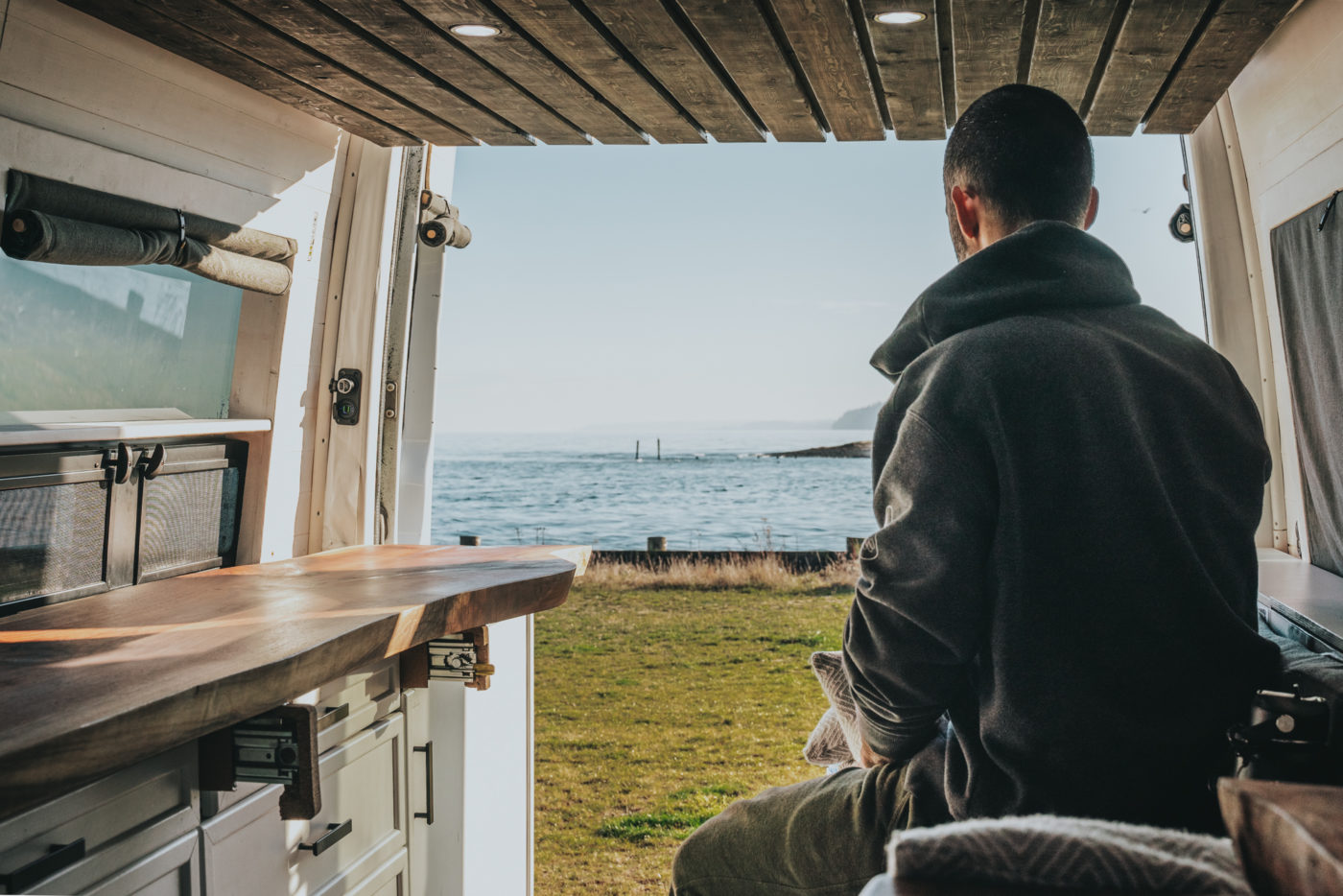
READ NEXT: 10 Beautiful Sprinter Van Conversions to Inspire Your Build
How do you cook in a van?
Cooking in a van may be much tighter than most home kitchens, but catching views out of the windows as you lean over the stove makes it that much better. Since our van is outfitted with 400A of power, our kitchen looks pretty similar to an ordinary house kitchen. We use a number of applicances, including our induction cooktop, convection toaster oven, InstaPot, as well as gadgets like Ninja Blender and immersion blender.
We do most of our cooking on the induction cooktop and are big fans of the InstaPot too. Our toaster oven is great for making toast at breakfast, roasting veggies, cooking pizza or even baking dessert!
We also bought a set of ceramic knives so we don’t have to worry about sharpening or rust and we’ve found lots of clever space-saving storage containers and organizers to make the most of all of our cupboard space and drawers.
While we opted for all-electric cooking appliances, lots of van lifers have a propane stove or a portable camp stove that they use to cook indoors or outside. These are handy to have since they don’t require electricity, but you do have to always make sure you have the propane filled up and a carbon monoxide detector.
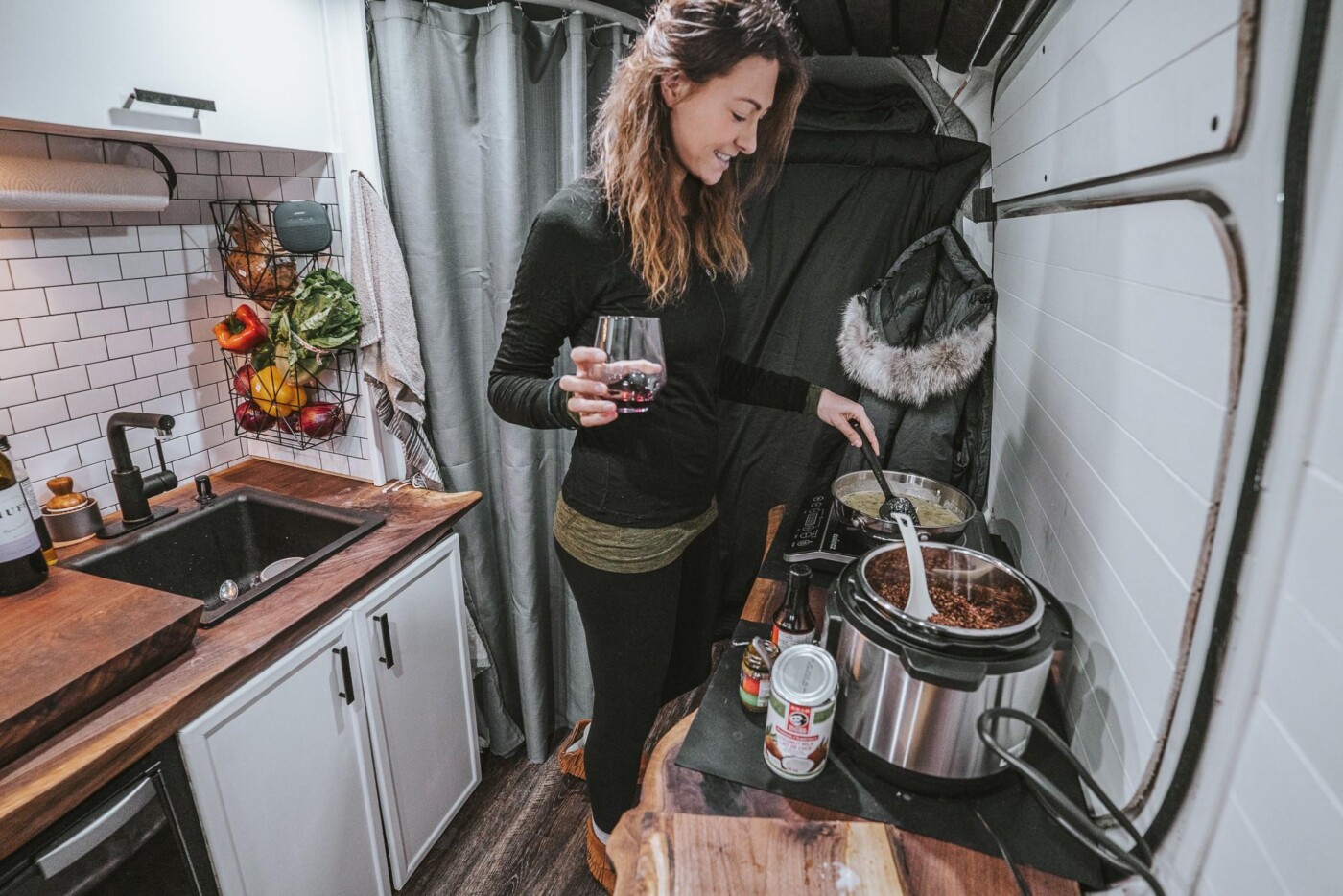
How do you get electricity in a van?
The best way to get electricity in a van is with a solar system. Figuring out what you need and how everything works can sometimes feel overwhelming, so starting with a solar kit, like this one from Renogy, is a great place to begin to take some of the guesswork out.
We knew we wanted a powerful system before we hit the road that would allow us to spend several days at a time without being plugged in. We have 2 x 300W solar panels and 4 x lithium-ion batteries, plus an alternator charger that allows us to charge our batteries as we drive. We never have to worry about running low on power, even on cloudy days.
A generator is another option for off-grid power that’s cheaper upfront but can be costly and noisy compared to solar. Nevertheless, a backup source of power is never a bad idea to have when you don’t know what the weather is going to be like.
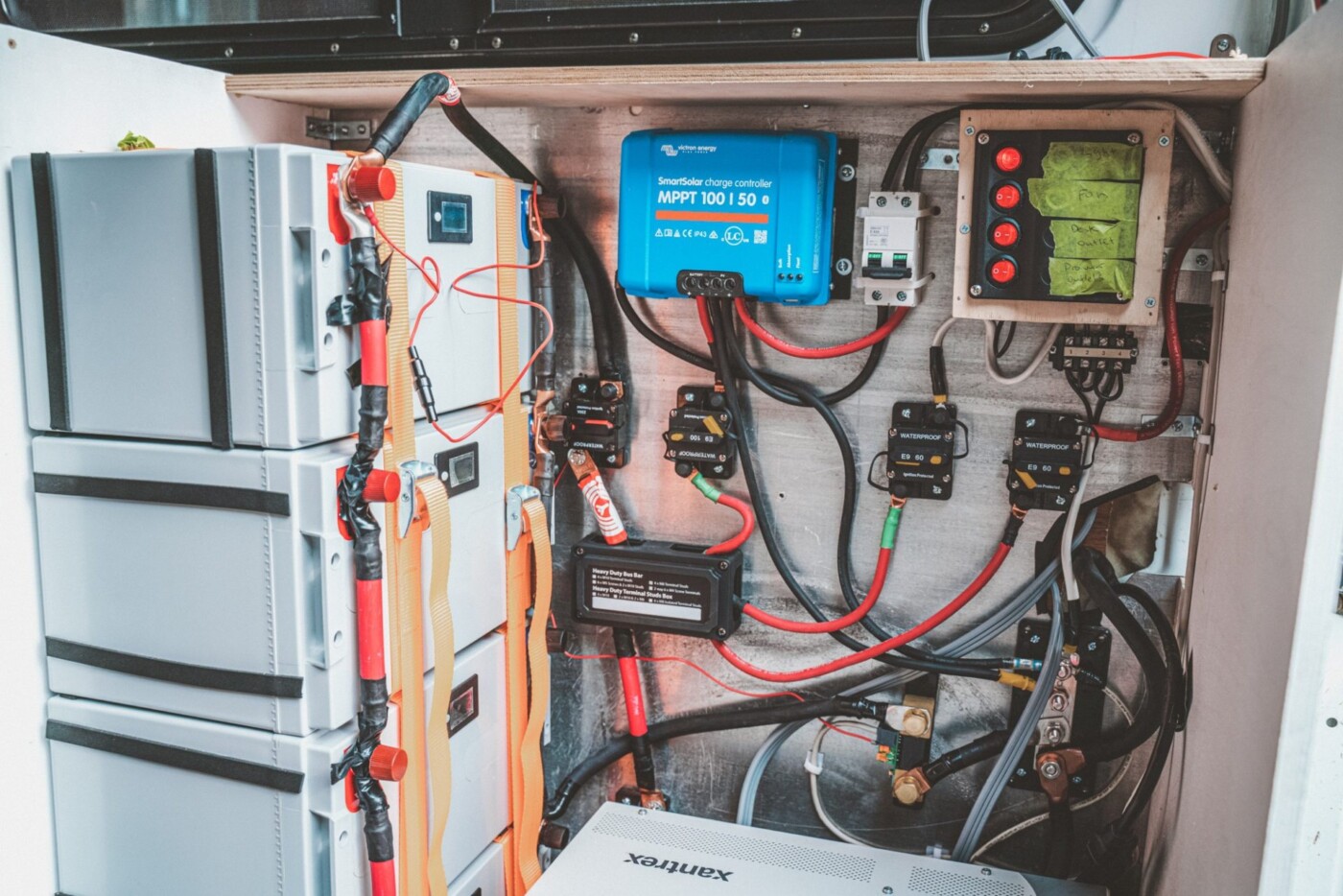
Where do you find water?
We have a 25-gallon freshwater tank inside our van and a plumbing system that pumps water straight to our sink or shower. We fill up our freshwater tank any time we stay at a campground or RV park. Lots of gas stations also have water spigots that you can use if you ask, and anywhere that has an RV dump station always has a water hose. Because we’re filling up from so many different sources, we have a filter system to assure that our water is always clean and chemical-free.
You can also luck out at some public parks or rest areas that have a public-use spigot. Living the van life is all about being resourceful. When water is not easily available, we’ll hop on our trusty iOverlander app, and look for water sources shared by others via the app. There is usually a source in every town!
How do you shower while living in a van?
Life in a van can be messy and having a built-in shower was important to us in completing our home on wheels. Hot water is fantastic, but somewhat limited with our 4-gallon electric hot water heater. Our showers may be a bit shorter, but they’re still much appreciated after a long day.
We also have memberships at Anytime Fitness, which has locations all over the US, Canada, and countless other countries. We try to hit the gym every 1-2 days and use their showers afterwards. Truck stops and public pools are also options for road showers that usually only cost a few bucks.
When it’s warm out, solar showers or propane-heated portable showers are amazing for rinsing off outside. You can even put up one of these shower tents for privacy and enjoy a makeshift mobile spa wherever you go!
Where do you find bathrooms while living in a van?
Going to the bathroom is always everyone’s favourite question and it’s not something you ever see in the glamorous social media photos. Travelling in a van means a lot of time on the road and therefore, plenty of opportunities to use public bathrooms at gas stations and trailheads, for example.
Campgrounds and RV parks always have bathrooms, along with the local coffee shop where we might be stopping to get a tea in the morning anyway. For situations when we don’t have access to a public bathroom, we have our portable toilet. We use it daily and while it’s not a super fun task to clean it, the convenience of having a bathroom on board is certainly worth it.
How do you find the best van to live in?
Buying a van to live in is so much more than shopping for a car or searching for an apartment. We put together this in-depth article about how to choose the best van for a camper conversion where you can find everything you need to know about what to look for and why it matters, along with a list of the best vans for van life.
Finding the perfect van requires a lot of research and is a different process for everyone. We spent a month researching before we decided on Benji and that time was super valuable to get a feel for what we needed to live full time in a van comfortably. Thinking about your lifestyle and everyday activities will help you decide and plan out your living space. After all, the best vans to live in are those that work with your needs and budget.
What do you do for health insurance?
Thankfully, health insurance isn’t a worry or an additional cost for us Canadians but for others in the US or those living in vans outside of their home country or province, we recommend Safety Wing. Their plans are affordable and are catered to nomads like us who are rarely in one spot. They’ve even got you covered for Covid-19 insurance, which is great peace of mind during these uncertain times.
How can you make money while living in a van?
Making money on the road is an important part of living the van life. If you’re already set up at a job that allows you to work remotely, you have the freedom to work from anywhere as long as you have internet and electricity. One positive outcome of the pandemic is that more and more people are able to work remotely, opening up the possibility for converted van living.
You can start a YouTube channel or a van life blog to chronicle your travels and potentially make income through partnerships or affiliate marketing. You can work freelance using platforms like Upwork or Fiverr where you can complete tasks for people all over the world. You can even teach English to kids overseas if you have reliable internet and are ok with unusual work hours.
For those who aren’t as computer-savvy or prefer to work with their hands, you can look into doing seasonal work like fruit picking in the Okanagan or becoming a camp host. Programs like Workamper allow nomads to work in campgrounds in exchange for a campsite and some cash. If you’re buying a van for travel and travel only, you can save up money ahead of time and keep a budget for road trips.
Since we have been traveling full time for the last 5 years, transitioning to living in a van was easy. Our blog, social media channels, and other income sources can easily support our full-time van life.
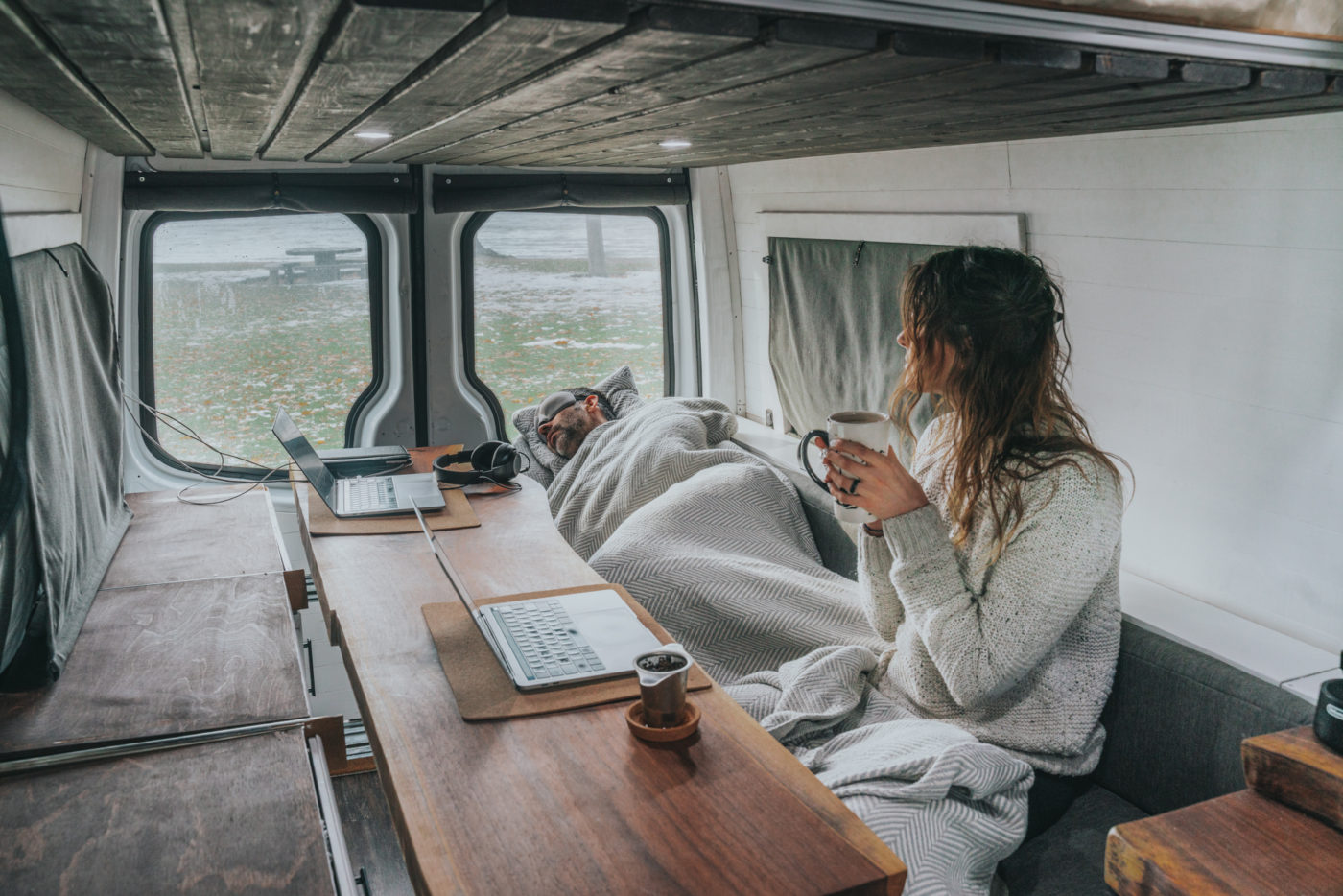
How do you stay warm while living in a van in the winter?
Living in a Sprinter van in Canada is not as easy as it would be to do van life in say, Australia, or another warm country. To prepare for the harsh temperatures, we invested in good insulation and a powerful heat source. During our build, we made sure to insulate our walls and floors as much as possible so we can efficiently heat our van.
We installed a diesel heater to pump out nice, dry heat without putting too much of a drain on our battery bank or creating excess moisture like propane does. It has stood the test of -20°C temperatures in the Rocky Mountains and always keeps us warm and comfortable.
Some vanlife tips for staying warm in the winter are to always have warm blankets and extra socks around and to cover up your windows when possible to prevent any drafts. Using a material like Reflectix will block drafts and prevent heat loss as long as you have a bit of air space between the insert and the window. They’ll also double as heat shields in the summer when the sun is baking through the windows.
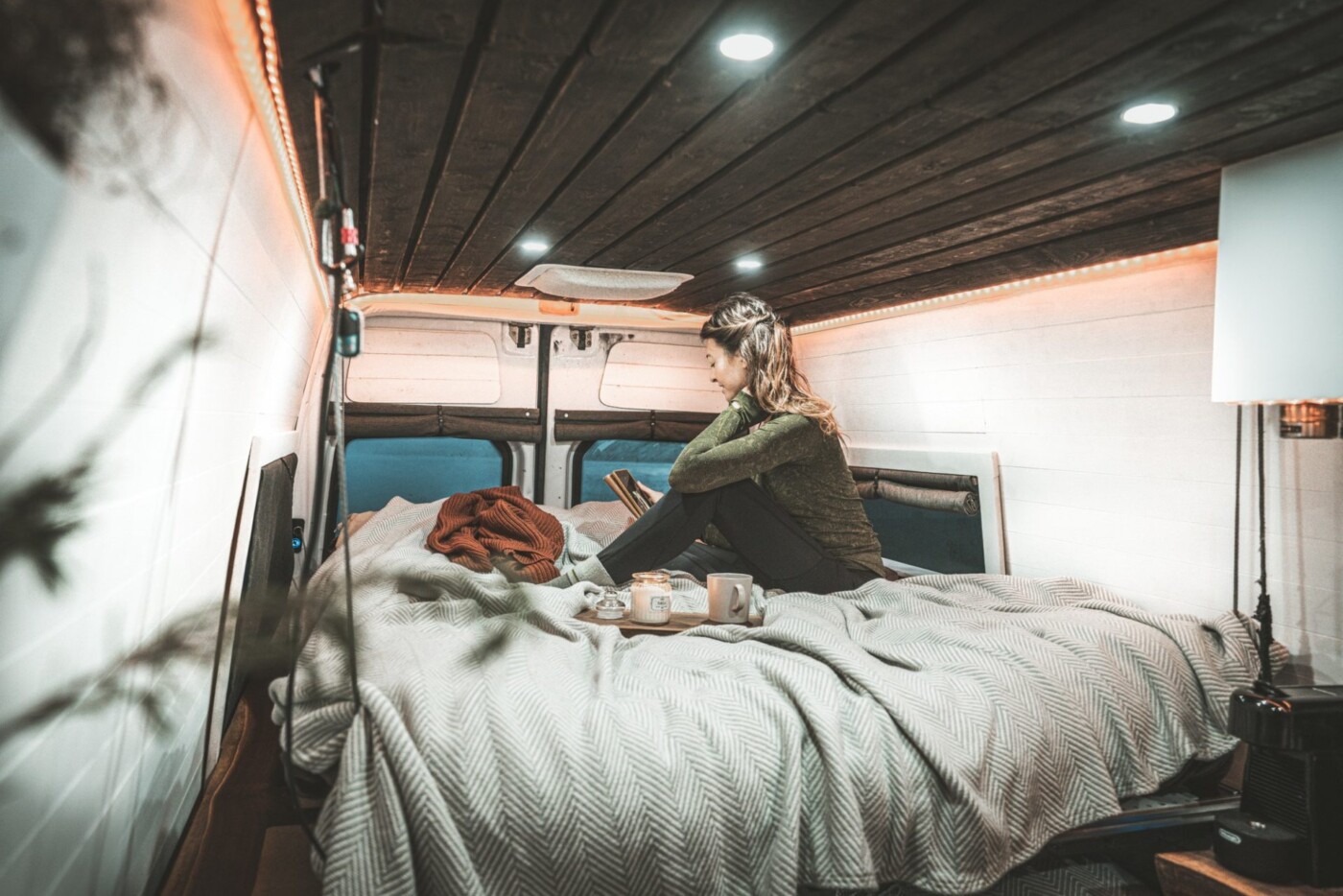
How do you stay cool in the summer?
Even with a robust solar system, running an air conditioner in a van isn’t practical unless you’re plugged in. In Canada, we have far fewer hot days than cold days, but we still considered beating the summer heat when we were doing our build.
To keep air circulating, we installed two MaxxAir fans that keep air circulating in our van and keep us cool on hot days. We installed one over the bed and one over the kitchen so we can always have fresh air moving through the van and not just in one spot. We can keep the vents open even when it’s raining and they create an amazing cross breeze!
How much does it cost to live in a van?
The cost of living in a van has three aspects to it: the cost of your van, the cost of your build, and the cost of your day-to-day expenses. While finding a good van to live in and building it out to your needs is the first step, your monthly expenses vary largely based on how much you travel.
Buying a van for traveling means lots of gas fill-ups and the cost of campgrounds will replace your rent or mortgage payment, along with the recurring costs like insurance and vehicle maintenance. For some, van life can be a great way to save money and live rent-free, but it’s not as cheap as you may think when you’re doing lots of activities and city-exploring.
Living in the van has decreased our monthly travel expenses since there’s no need for hotels and rental cars, but has increased other areas like groceries due to more frequent trips and not being able to stock up or buy in bulk. Things like cooking your own meals and utilizing free campsites wherever possible are good ways to save money, along with opting for free entertainment like hiking. Whatever your budget, it’s crucial to have some money set aside for emergencies since vehicle repairs and unexpected expenses are all part of living the van life.
READ NEXT: The REAL Cost of Living in Costa Rica: What to Budget for Life in Paradise
How do you pack for living in a van?
With such limited space, there is really only room for things that are useful and important—aka no room for “stuff.” Cutting down your clothing collection to a minimalist wardrobe means ditching that top you’ve only worn once and only keeping the pieces that are versatile and easy to take care of.
We’ve been living out of our suitcases for years, so we didn’t need to downsize any further to accommodate our precious storage space. We did add possessions to outfit our kitchen and turn our van into a home, but we bought consciously, sticking only to the bare essentials and opting for items that are functional and long-lasting. Check out our list of the 52 Best Van Life Essentials to find some of our favourite van-friendly items.
While we were already well-versed with minimalist living, many people coming from large homes or apartments will have a lot of downsizing to do. This process can be a challenge but results in an incredibly liberating feeling once you realize how little you actually need. Plus, you can sell all your possessions and use that money to fund your first vanlife road trip!
How do you stay organized while living in a van?
Staying organized in such a small space is crucial. Luckily, Oksana is a bit of a neat freak and runs a tight ship when it comes to organization in the van. When everything is well organized, even the smallest of spaces have plenty of room for all of your things.
Our van stays nice and tidy with the help of dividers, storage baskets, and extra shelves. It’s really important that every item has its place with a designated storage area for all of our clothing, kitchen essentials, and outdoor gear.
Sprinter van life may be tiny, but proper organization allows us to maximize all of the space that we do have.
How do you stay connected?
Having access to the internet allows us to work, stay in touch with friends and family, and plan our next road trip. We use WiFi at campgrounds whenever we’re staying at one and have a WiFi range extender for times when our signal is weak. Many places on Boondockers Welcome also offer free WiFi, which is a huge perk!
When we’re not at a place with WiFi, we use our cellphone’s 4G hotspot that helps us stay connected in places where there is no wifi. We just pay a monthly fee, like a cell phone plan, and can access the internet anywhere there’s cell service. It’s a great alternative to hopping between coffee shops or staking out a parking lot where you can find a signal.
How do you get mail?
With no fixed address, getting mail means having to get a little creative. We send things to friends and family’s houses across Canada when we know we’ll be heading that way, but for other times, there are a few different options for nomads like us.
Getting a P.O. Box is a good place to start, with Canada Post offering Flex Delivery so you can pick your parcels up at post offices across the country for no additional fees. The downside to a P.O. Box is that you can’t use this as a valid address for any official purposes like a drivers license or filing your taxes. The UPS Store has postal boxes that give you an actual street address for about $200/year that are perfect for van life.
Amazon packages are easy to pick up on the road through Amazon Lockers, which are all over the US and are starting to pop up in Canada too. Living on the road has its hurdles but thankfully, getting mail is not one of them.
How do you decide where to travel?
Traveling the world is a different journey for everyone. You might want to try vanlife to check out every National Park or to visit your distant relatives all across the country. Some people travel in search of warm weather or to find wherever the waves are the biggest.
For us, when the pandemic happened and our travel plans all came to a halt, we thought it would be a great idea to finally explore our own backyard. We researched all of the places that people from other countries come to Canada to visit and planned our journey around ticking these unique destinations off our list.
Weather is also a big factor, which is why we left Ontario for the west coast to save ourselves from the snow and frigid temperatures. We’re focused on discovering what makes Canada so special and want to check out all the cool places that Canada is famous for and then some!
Where do you do laundry?
Just like using public bathrooms, life on the road will have you passing by laundromats all the time. While doing laundry at a laundromat isn’t as convenient as having a washer and dryer in-house, you can do all your laundry at once and take those couple hours to catch up on cleaning or organizing.
We also take the opportunity to use laundry facilities whenever we’re staying at a campground or RV park so we know we’ll be ready to go once we set off for our next destination. If you want to have a backup system for days where you only have a few things to wash, try a Scrubba Wash Bag for an eco-friendly and portable solution that allows you to do laundry anywhere. Just make sure to use biodegradable laundry detergent, we particularly like thsi plastic free variety!
How do you stay fit?
In the summer, the outdoors is your own multi-purpose gym. Whether you’re hiking, swimming, climbing, or doing another outdoor activity, keeping fit outdoors is fun and free! Living the van life means you’ll spend lots of time outside so staying fit is just part of the package. For lots of van lifers, having storage space for bikes or surfboards is essential because many travel plans are based solely on outdoor activities.
In the winter, staying fit can be a little bit harder. While our Sprinter is spacious enough to cook and hangout, it’s a bit too tight for exercising and stretching. We put on our thinking caps and decided to get gym memberships to Anytime Fitness so we have room to work out and can take unlimited hot showers—way to kill two birds with one stone!
What do you do on rainy days?
While being outdoors is a big part of the van dwelling lifestyle, living in a van full time means having to deal with rainy days spent indoors too. These are the days where we’ll catch up on work or cleaning, or cook a really nice meal that we wouldn’t have time to make otherwise.
Sitting in the van with a nice, hot cup of tea while curled up with a book is super cozy and hearing the rain hit the metal roof is actually quite peaceful. Van life is about enjoying your surroundings and making every day count, regardless of the weather. Some days we’ll take a nap or watch Netflix marathons, while others are spent around the table with our laptops and a bottle of wine.
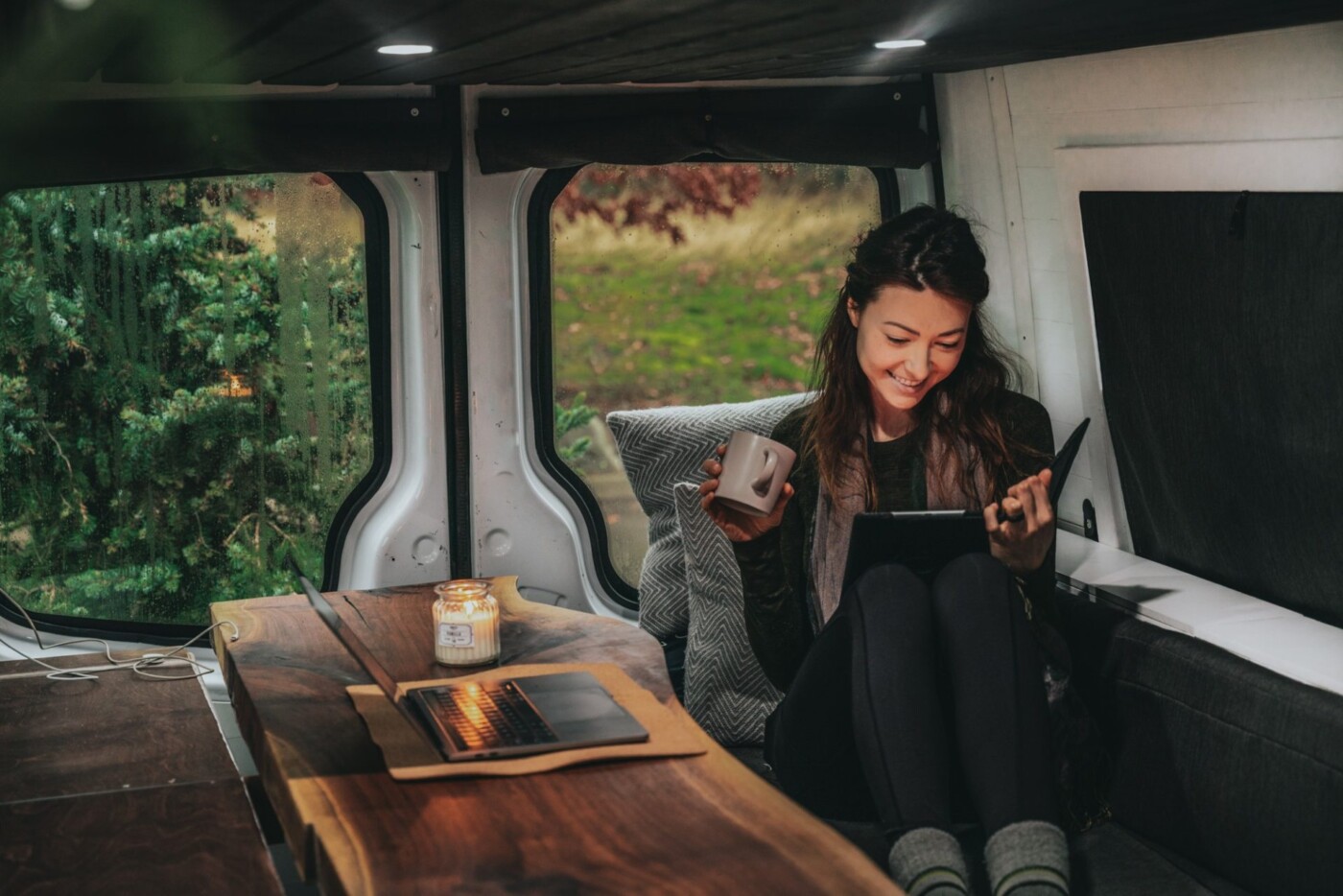
How do you live with your partner 24/7?
We thought we were used to being together 24/7 while traveling full time, but moving into an 80 square foot space is a whole new level of living closely. The tiny living aspect of van life makes it more challenging, but we do still need some alone time to stay sane and enjoy our own space.
We struggled at first, but have managed to incorporate alone time into our travel plans whenever we can. Usually, this is when Max goes to the gym and I choose to forego a workout in favour of some me-time. Let’s face it, it’s a sacrifice I’m more than happy to make!
To give us a break from van life and catch up on some much-needed showers and laundry, we’ll rent an Airbnb for a few days or stay at a hotel every few weeks and recharge. Even though it’s just a few days, having the extra room to live without constantly bumping into each other is a good way for us to get some space and stretch out a bit.
Is it safe to live in a van?
Van life, in general, is as safe as living anywhere as long as you’re conscious of where you’re parking and are not relying on staying on a city street in a shady area. We choose to stay at a lot of campgrounds and RV parks where safety isn’t an issue because the grounds are private property with plenty of other people around.
We’re always conscious to not leave any valuables out in the open wherever we park, especially if we’re leaving the van to go on a hike or do laundry. Some people choose to have extra security measures like alarms or deadbolts, but these things are better suited for those living in cities who have no choice but to park in town.
What is life really like in a van?
Real vanlife is so much more than what you see on Instagram. There are plenty of messy floors, popped tires, and emergency bathroom breaks that just don’t make the cut into the beautifully staged photos and stories.
The reality of living in a van is life in the slow lane. You’re never rushing to get to the office on time or sitting in rush hour traffic after an exhausting day. Instead, you’re taking everything one day at a time and moving at a pace that feels right for you, whether that’s based on how quickly you want to get to the next National Park or how many hours you feel like driving that day.
While the pace is lovely, everything else moves a little slower too. Simple things like getting ready or cleaning all take that much longer in the van because you’re constantly putting things away and trying to stay organized while doing so.
Cooking, washing the dishes, and even just preparing to drive all have a laundry list of things you have to check and secure before setting off. There is no definitive guide for how to live in a van so it takes a lot of adaptability and preparedness to figure things out as you go.
Final Thoughts
While vanlife isn’t all pretty views and wild rides, it is an amazing experience that has shaped a lust-worthy lifestyle for those wanting the freedom to travel with all the comforts of home. We’ve managed to create a home for ourselves that can be anything from an adventure mobile to a café on wheels and everything in between.
There are a lot more things to think about when doing even the most menial of tasks, like going to the bathroom or brushing your teeth, but all of these daily challenges are what make van life interesting. After all, where’s the fun in knowing that there’s always going to be water when you turn on the tap or power whenever you want to turn a light on?! Van living isn’t always glamorous, but it sure is an incredible way to live.

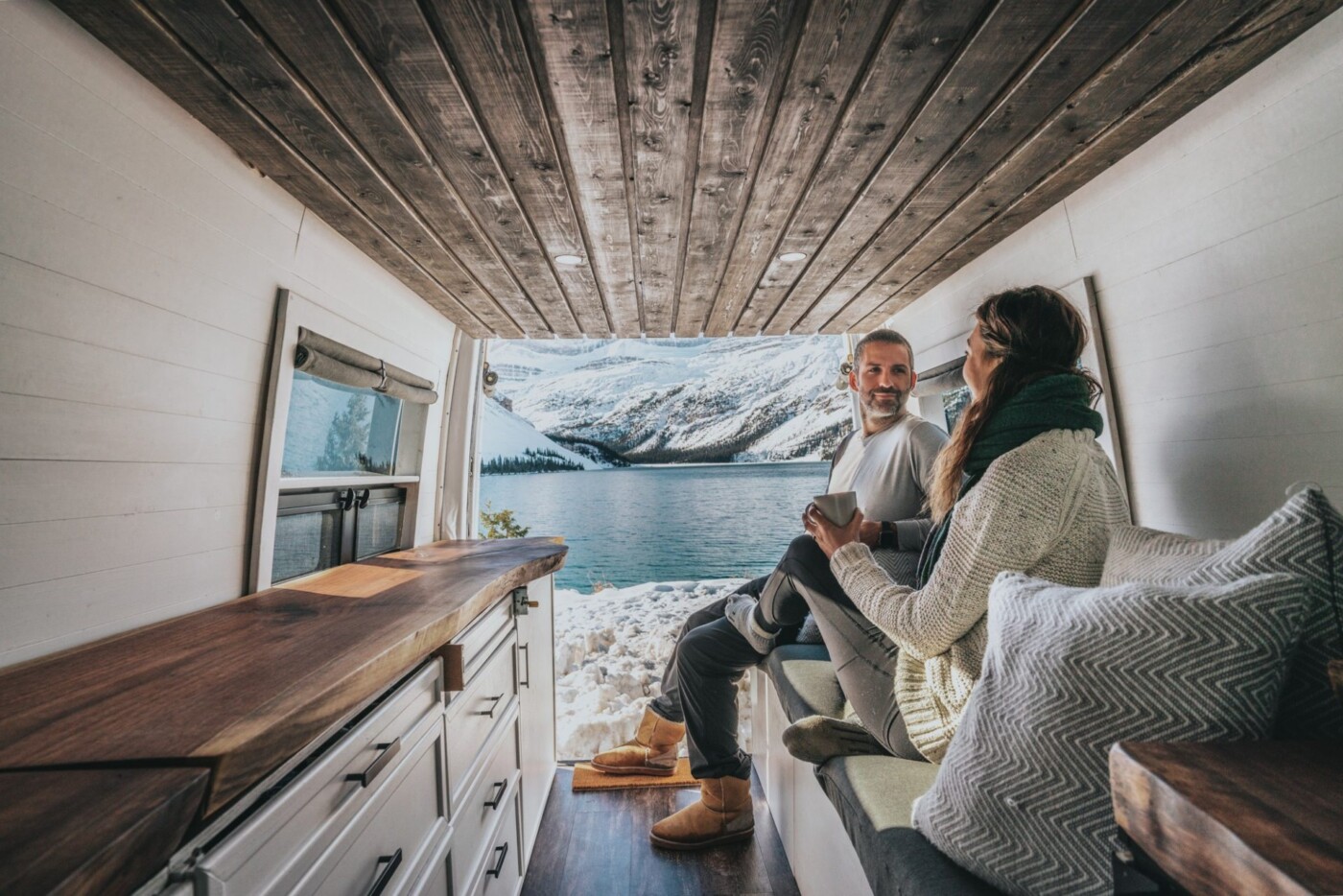
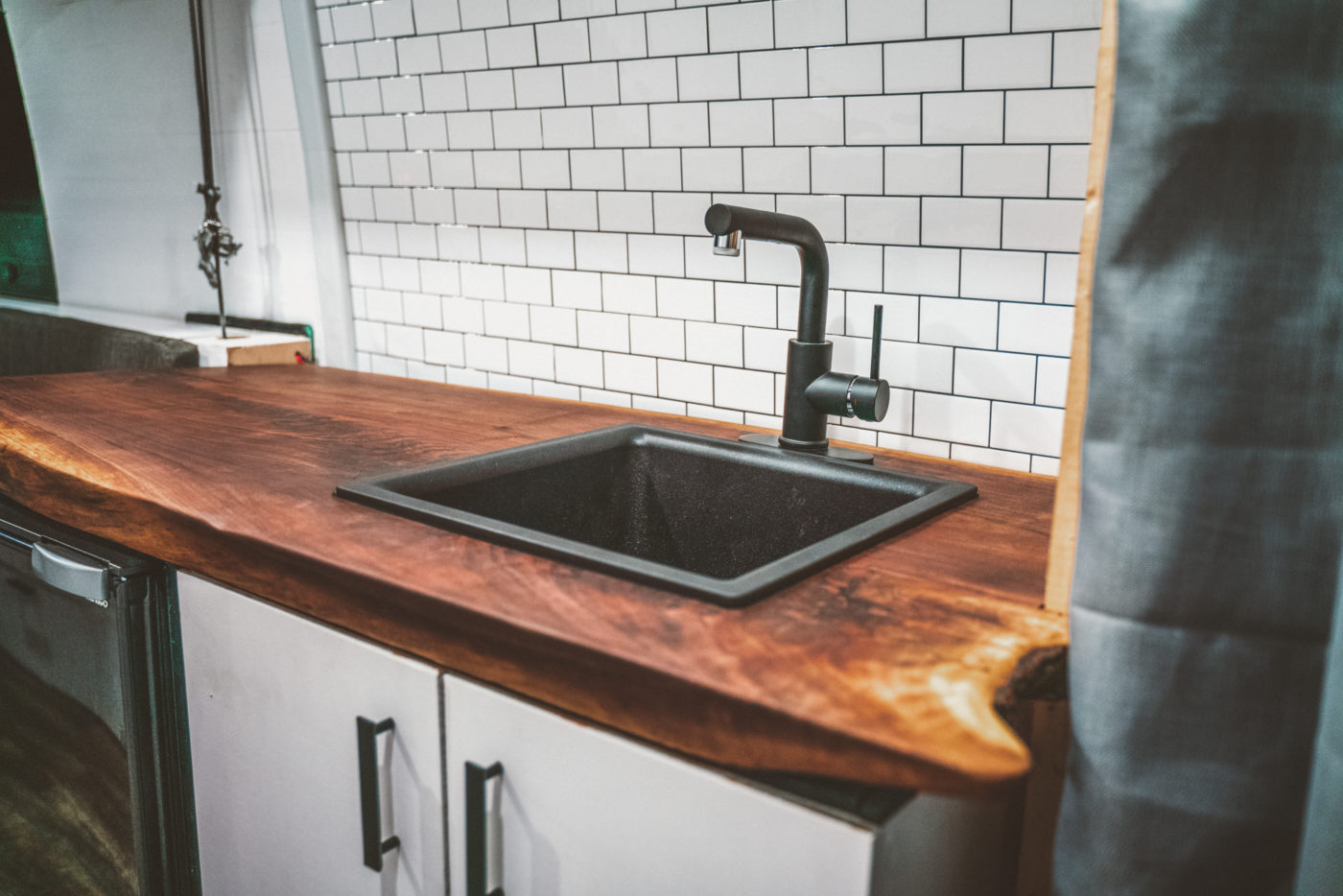
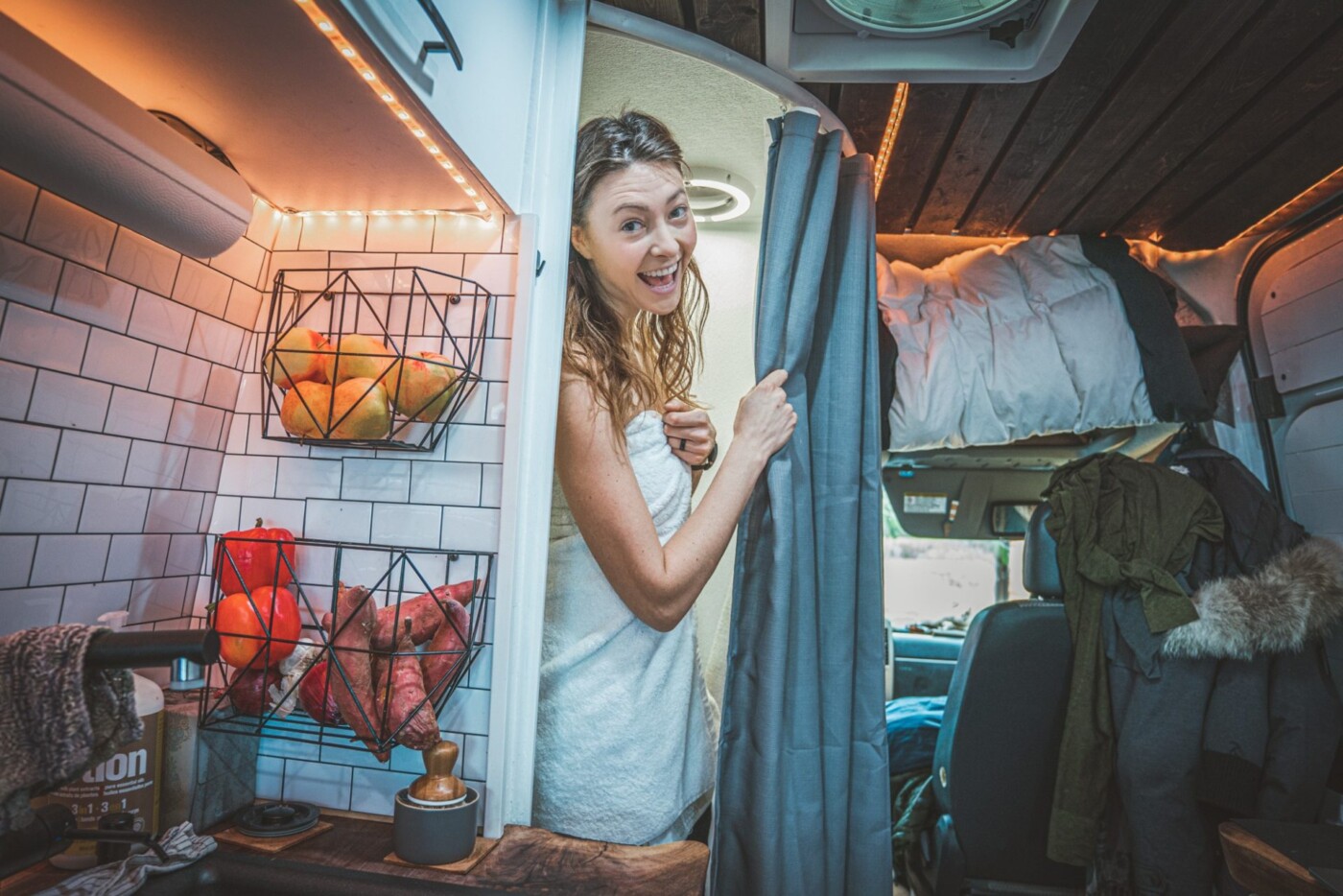

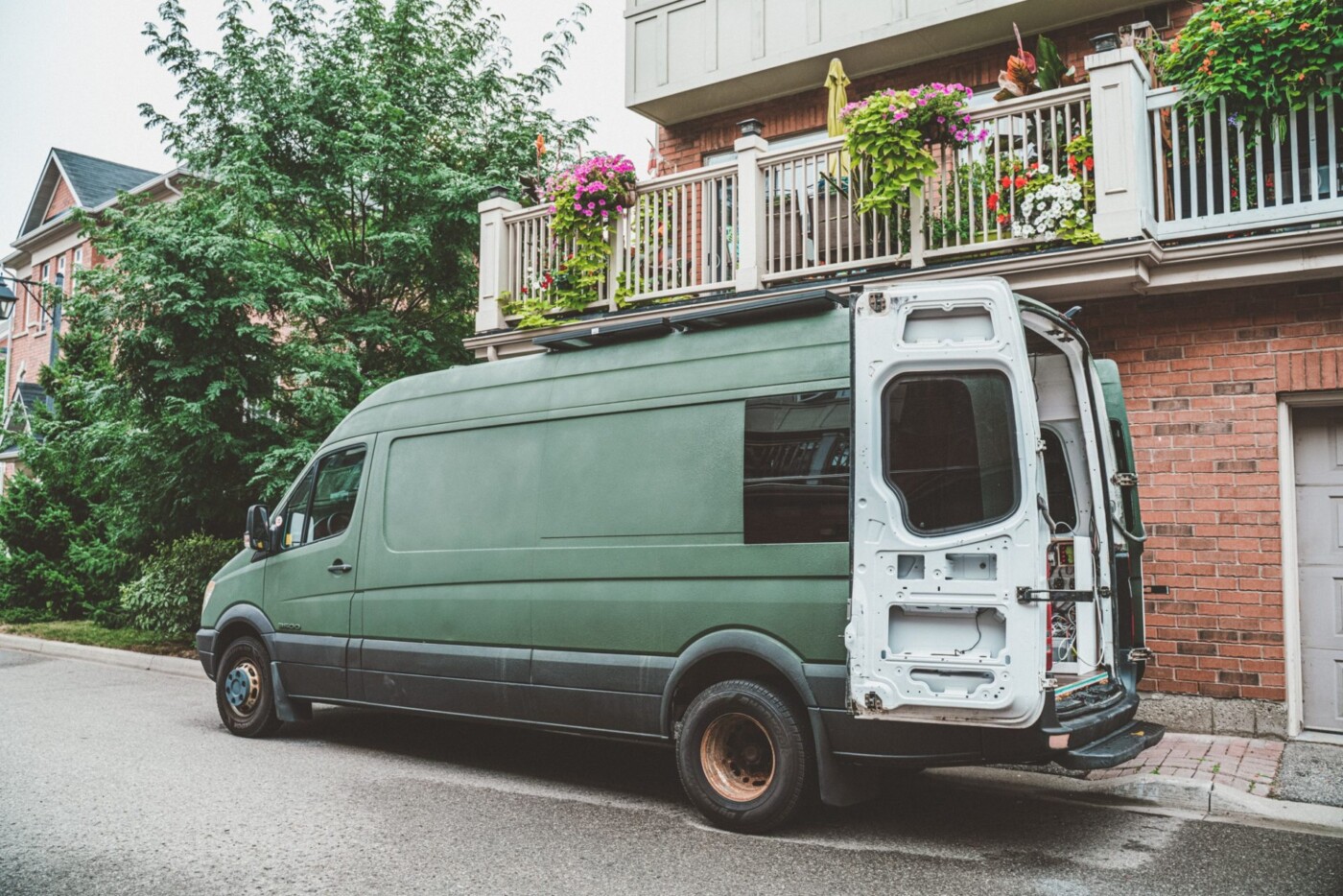
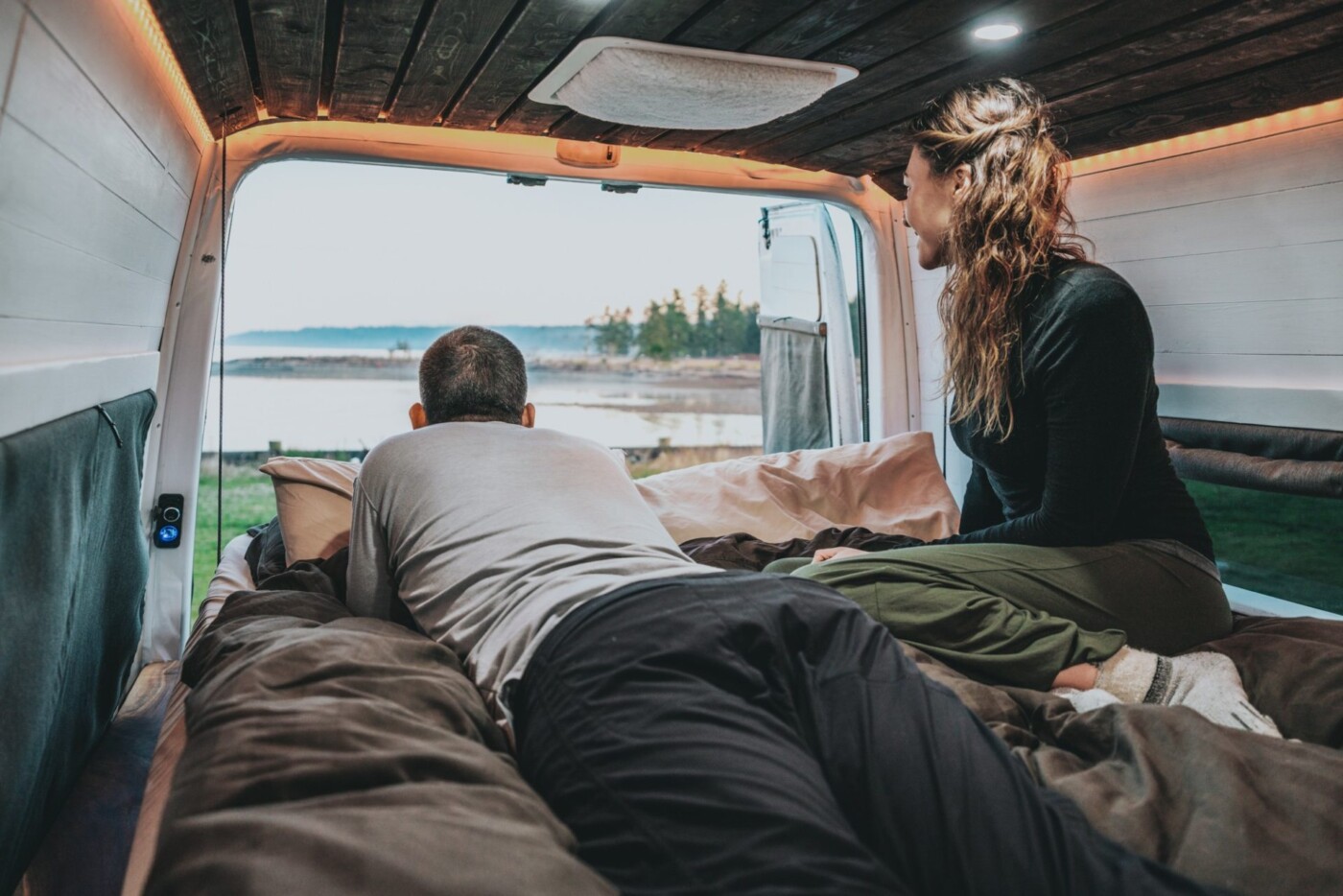
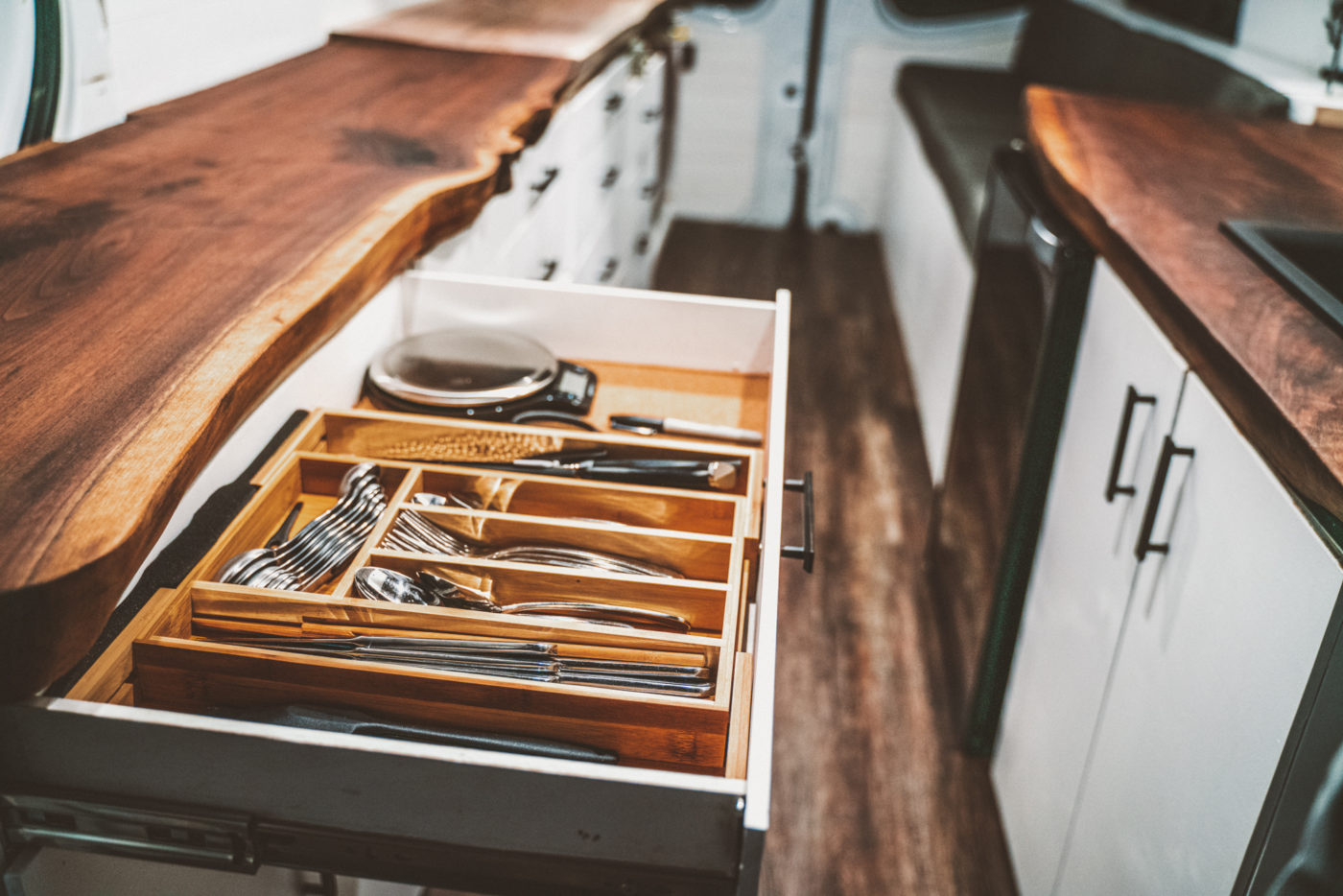
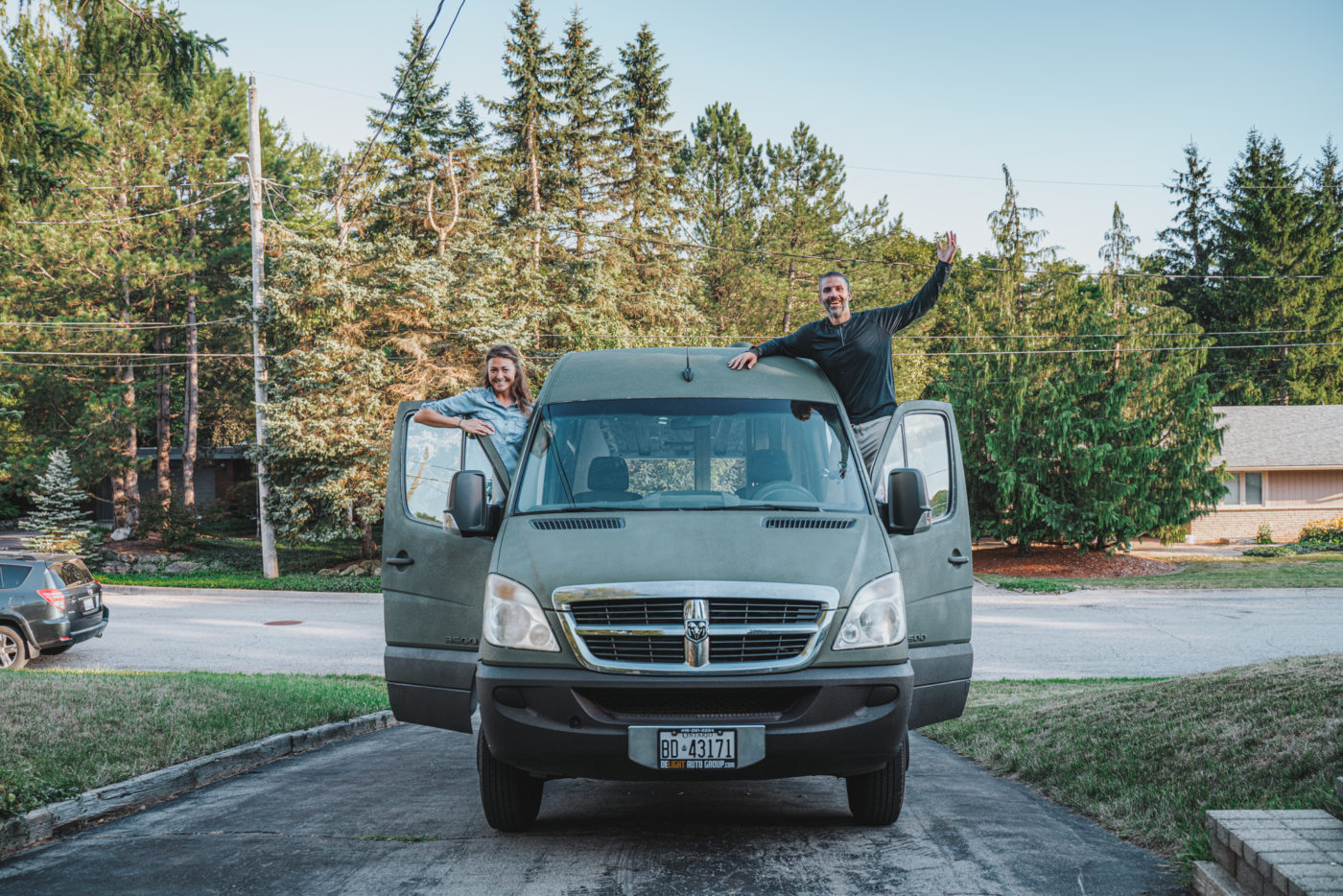
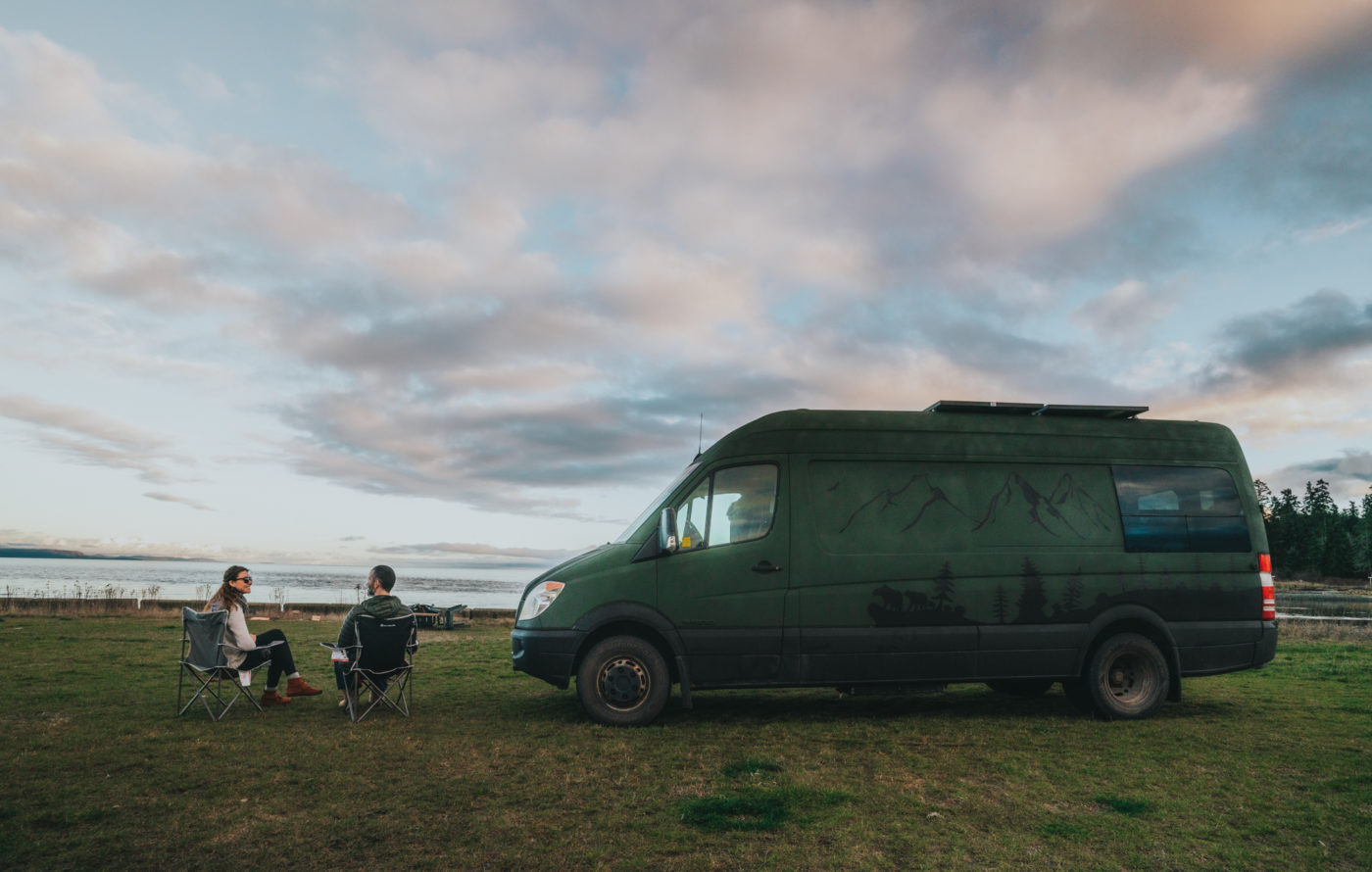

Can you drive through a car wash, with solar panels?
I have solar panels on my roof and I am trying to determine if it is safe to drive through an automatic car wash or what my best option is.
We have only ever done manual car washes, never an automatic one
Thanks for sharing! I’ve never travalled in a van before but it is on my bucket list so reading about your experiences was very interesting and useful.